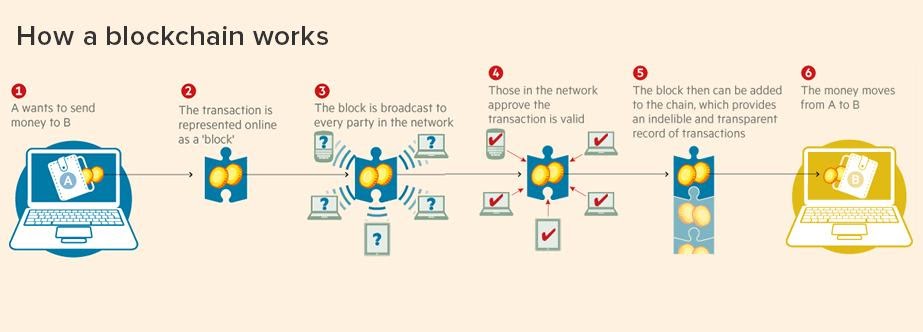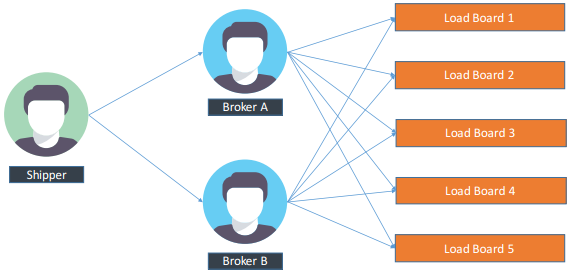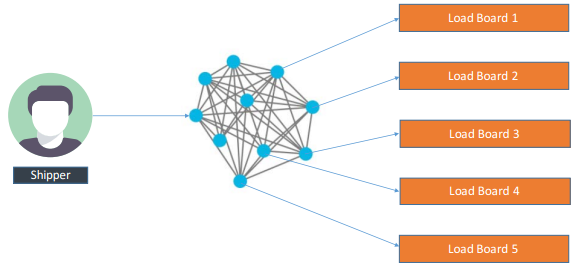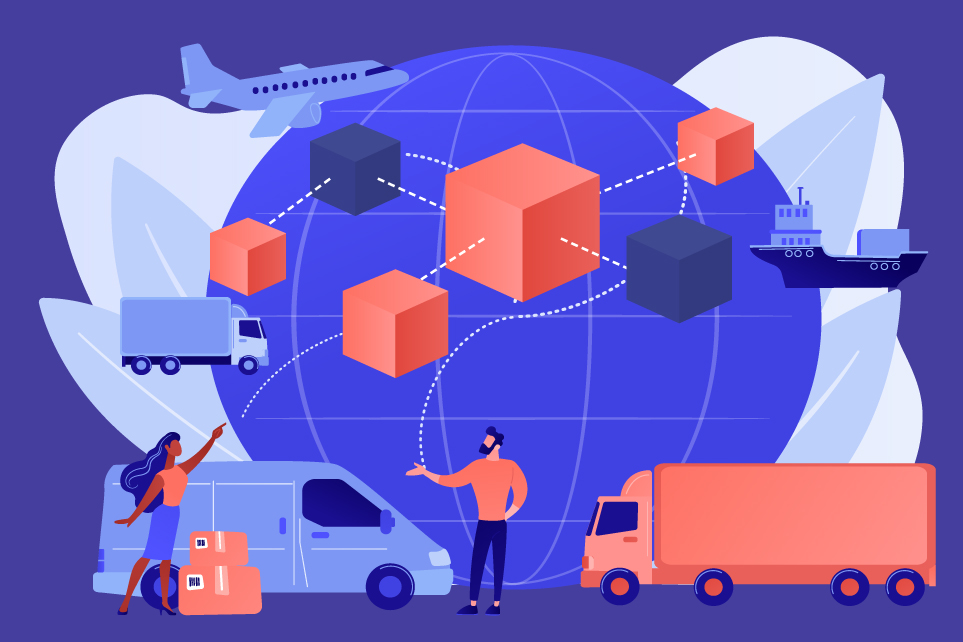Companies in the commercial transportation industry sink or swim based on their ability to adapt to consumer needs, and implement new technologies that help them increase efficiency and lower the costs of shipping.
In the past year, blockchain technology has emerged in the world of logistics as a solution to some of the major inefficiencies that have plagued the industry for decades.
But there’s one problem:
For most business owners, blockchain is no more than a buzzword, and its applications can be obscure and difficult to understand. It’s all over the news and it seems to be taking over and revolutionizing every industry.
What Is Blockchain, Anyway?
Blockchain technology is based on a complex branch of mathematics called cryptography. Needless to say, the inner workings of the math behind blockchain are beyond what you intend to learn about in this post.
Instead of getting in the weeds of all that, here’s a helicopter view:
Blockchain is a technology that originated out of a branch of mathematics called cryptography.
In short, it’s a decentralized, shared digital ledger that that relies on the consensus of a global peer network to operate. The digital ledger is essentially a series of encrypted “blocks” that are linked together in a public “chain.”

Modifying the data in one block is impossible without modifying the entire chain and receiving consensus of the entire peer network.
This makes it incredibly difficult to perform malicious activity or falsify data. Once it’s in the blockchain, it’s pretty much in there for good.
As inefficiency mounts in the world of logistics and transportation, more companies are joining the charge to incorporate blockchain-based technologies into the industry. Let us take a closer look at how blockchain is empowering the logistics and transportation industry.
Better Freight Tracking
As demand for same day and on-demand delivery increases, and expectations of consumers become higher and higher, commercial transportation companies are faced with an ever-increasing need to innovate.
Many companies are already investing in great tracking technology, but scaling this technology to more difficult user demands is proving difficult—particularly when it comes to authentication.
According to a research paper by TMW, transportation companies need authenticated secure data to consistently improve their operations. The current systems for providing and recording this data—reliant on EDIs and APIs—are subject to misinterpretation or manipulation, which can have dire consequences on the global supply chain.
Blockchain’s Impact
With the help of blockchain technology, none of these issues would exist to nearly the same degree.
By using the blockchain for data authentication, the entire network can contribute and validate data, and it is no longer subject to tampering.
Increased reliability of tracking information can also have an impact in the conservation of goods that are being shipped.
For example, refrigerated and temperature controlled transportation relies on on-time delivery. This efficiency is only improved with the blockchain.
There has been considerable investment in blockchain technology in the world of temperature controlled goods and perishables. IBM has partnered with other global companies to launch an initiative “designed to bring the requisite efficiency, transparency and authenticity to food supply chains around the world.”
Increased Efficiency
Blockchain, with the help of innovations in IoT, can be particularly useful for capacity monitoring.
Cargo Volume often defines the cost of shipping freight. By using IoT sensors in trucks and other shipping vehicles, shippers and transportation companies can detect the amount of space taken up in a shipment and determine cost accordingly, transmitting all of this information to the blockchain.
Remember our example from earlier, when we discussed the fact that 8.5% of sensitive pharmaceutical shipments experience temperature deviations and many of these shipments become too damaged to get to market?
With the use of blockchain enabled IoT sensors, Swiss firm SkyCell was able to create air freight containers for refrigerated biopharmaceuticals that monitor temperature, humidity and location. Because of this, in 2017, SkyCell was able to bring their temperature-deviation rate down to less than 0.1%.
Not only that, but SkyCell uses its cloud platform to record all documentation throughout the process on a blockchain ledger, such as bills of lading and customs forms.
Therefore, blockchain technology is acting to maintain the integrity of the valuable product being transported, but also to create an immutable, secure record of all documentation throughout the shipping process.
Keeping in mind the fact that global shipments often undergo numerous checkpoints and are handled by a variety of companies along the way, having this type of data on a secure, accurate record becomes a huge advantage for shippers.
Effective Fleet Tracking
The importance of tracking isn’t limited to delivery performance. It’s also applicable to the performance of individual vehicles within a fleet.
When a large company or a small business wants to purchase a second hand delivery vehicle, the blockchain can help to authenticate information on the past performance of the vehicle and its maintenance history.
While companies like CarFax already exist for this purpose, they are intermediaries. The blockchain can store and validate all of this information for buyers and sellers without the need for a middleman.
Jack Legler, Technical Director of the American Trucking Associations’ Technology & Maintenance Council, believes that “distributed ledger technology will find its way into the mainstream of contract transactions in the logistics and transportation industry.”
If the records of all used parts and vehicles were to be placed on a secure, immutable ledger, there would be a much more standardized and reliable way to determine pricing and other factors inherent in purchasing.
Easier Carrier On-boarding
Just as blockchain can help validate the records of a second hand vehicle, it can also help to validate the driver records of a new carrier.
For example:
Let’s say a freight broker is trying to reach capacity for a load in a particular pickup location. The broker has identified a new carrier it can assign the load to, but can’t move forward with the assignment until the carrier has been properly on-boarded.
This situation can be debilitating in a time crunch.
Blockchain technology can solve this problem by creating a decentralized network that holds all the necessary records of carriers across the transportation and freight industry. This information would be nearly impossible to falsify and almost immediate to verify.
Vehicle to Vehicle Communication (IOT)
Here’s yet another way that blockchain technology and the Internet of Things can combine to improve efficiency in the trucking industry:
Some companies are already implementing Vehicle to Vehicle (V2V) Communications, which essentially allow for multiple freight vehicles to form a platoon and communicate, improving fuel efficiency and safety.
Storing and validating the data created by the use of V2V Communications on the blockchain can help transportation companies across the world to streamline their operations.
Reliable Load Boards
Many transportation companies are wary of load boards because data can often get muddled or duplicated, providing an unreliable representation of demand.
With the blockchain, shippers can post timestamped loads that are recorded and verified by the decentralized network. Because of this, a particular load cannot be duplicated and the data will maintain its integrity.
This also eliminates the need for a middleman in the form of a broker, because the blockchain can authenticate load data, prevent duplication, and make it visible to load boards.
Here are some helpful diagrams from TMW that explain the process with and without blockchain technology:
Without blockchain tech:

Lots of potential for error
Notice how easy it can be for multiple brokers to post loads to multiple load boards, increasing the chance of duplication and skewed demand.
With Blockchain tech:

Much better
Using the blockchain, the load information is timestamped and stored on a decentralized network, accessible to different load boards.
Smart Contracts
Smart Contracts may be the single most impactful blockchain enabled feature to the freight industry. They are essentially self-executing tasks that are coded through the blockchain and executed when a certain condition is met.
To use a basic example, if a company wants to release payment to a shipper when an item reaches its destination, that company can program a smart contract to automatically pay the shipper when the item has reached a specific location.
According to Jeff Garzik, CEO of Bloq, supply chains nowadays are extremely inefficient because they rely on paper-based systems, “where forms have to pass through numerous channels of approval, which increases exposure to loss and fraud.”
By using blockchain, smart contracts could completely eliminate the need for all of these administrative steps, cutting costs and virtually removing all possibilities for error.
If we consider the fact that administrative costs make can make up 20% of the overall costs of transportation, the amount of money saved by using smart contracts effectively could be staggering.
Increased Liquidity
Sweetbridge is a blockchain based technology stack that addresses key inefficiencies in the global supply chain.
The objectives of Sweetbridge are particularly relevant in that they can have a major impact on solving many of the existing problems in the freight and trucking industry, such as supply chain liquidity, supply chain operations and supply chain flexibility.
Specifically, Sweetbridge has found a way to improve the efficiency of settlement between parties throughout the supply chain. As we discussed earlier, this is a massive issue in the transportation industry, as billions of dollars are tied up in payment disputes on a daily basis. In fact, companies wait an average of 42 days before receiving payment.
That’s 42 days of reduced liquidity and unnecessary administrative work.
By using Sweetbridge for settlement, companies “can reduce borrowing costs by 75% and increase liquidity by 25%.”
Sweetbridge also estimates that just by using its technology for settlement, “all parties in a supply chain can make 2% to 4% more profit.”
Conclusion
As this industry morphs and evolves to accommodate ever-evolving customer needs and expectations, it’s important to be in the know when it comes to innovations that can change the face of commercial transportation. Blockchain is an absolute game changer. We at AppleTech have the prowess to develop blockchain based solutions for various industries. Reach out to us to see your concept turn into reality.

